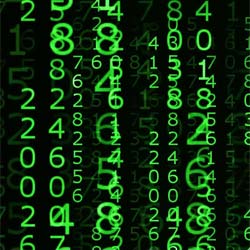The nature of reality
 Is the world a giant simulation in a super advanced computer, much like the movie The Matrix? With computer games getting more and more realistic, and advances in artificial intelligence, this seems plausible. It relies on the idea that we are biological machines, and that there is nothing in principle preventing a computer to simulate an entire human being or even the rest of nature and the universe, so how can we know if we exist for real or if we are a simulation?
Is the world a giant simulation in a super advanced computer, much like the movie The Matrix? With computer games getting more and more realistic, and advances in artificial intelligence, this seems plausible. It relies on the idea that we are biological machines, and that there is nothing in principle preventing a computer to simulate an entire human being or even the rest of nature and the universe, so how can we know if we exist for real or if we are a simulation?
With the current technology development explosion, we will at some point have computers powerful enough for such simulations. Those computers may already exist somewhere else, invented by an earlier life form. Since a simulation of a universe is so much more trivial to make compared to the creation of a real universe, you can imagine multiple such simulations running at the same time, so by pure chance it should be a safe bet to say that it is more likely that we are in a simulation.
The proponents of this idea are now looking for ways to detect it; glitches in the fabric of reality that gives it away. They argue that the simulation probably will cut corners to be more effective, and those cut corners could possibly be detected.
No matter now intriguing this idea is, at least as a plot for a sci-fi movie, I am not convinced. We don't know the inner workings of reality. The deeper we dig into the world of atoms, quarks and string theory, the more we find and the queerer it looks. The idea that there is a smallest building block seems unlikely, because we could always ask what this building block is made from. And how is it possible to break out of the physical laws of nature to see what mechanisms that really keep them working? How is it possible to even have an idea of what an extra-physical mechanism is like, given that we have no examples of them, and we are bound to the universe we live in?
I think this intellectual exercise is the product of the same people who say that ideas are separate from physical reality, for example that math and logic are independent of the existence of the universe. I think the opposite is true: math and logic are not the tools used to build the universe, they are the result of, or perhaps the very fabric of, the universe. They are either inseparable from the universe, or a result of how the universe was put together.
The real building blocks of the universe are probably so foreign to us that we don't have the capacity to understand them. I can't see why those building blocks need to be similar to the way our universe works, including time, space, physical forces, logic, intelligence or even consciousness. For example a computer program is something very different from the electronics that make the computer work. The electronics exist in a universe governed by three dimensions, time, physical laws and logic. The program exists in a universe governed by time, logic and one dimensional space (computer memory space).
When we try to figure out how the universe really works, we are like that computer program trying to understand what electronics is. The analogy is that we have time, logic and a vague sense of dimensions (one dimension) as our tools, and now we want to understand physical laws and more dimensions. This is a crude example, because what we really are trying to do is to understand something that is beyond the capacity of logic and reason.
People usually put consciousness and intelligence in a category of their own, because there seems to be a transcendent quality about them, as if they could exist separately from the universe. I think this is also false, and that they are as much in the fabric of reality as math and logic. They are in a way an expression or an extrapolation of math, logic and the physical forces. Outside of this universe they have no meaning and can not exist. There is no reality-neutral intelligence or consciousness, that could work in alternate universes made up in completely different ways.
So what is the difference between a simulation and the real thing then? Well, from our perspective as humans, none what so ever. The universe, as we experience it, behaves the way it behaves, no matter how it is constructed. Us knowing about the true nature won't change a thing.
And what does "simulation" really mean? We now have capacity to approximate natural phenomena in a computer, and we call them simulations. If we tweak this simulation, it will at some point not resemble reality anymore. Is it still a simulation? Is it only a simulation if it resembles reality? If we grant for a second that our universe is a simulation, do the life forms that created this simulation have to be in a universe that at all resembles our own? No they don't. The only constraint we can set on them is that they are in a universe that enable them to create a simulation where our universe can be constructed, with three dimensions, physical forces, time and logic. So what is the difference between calling them the creators of our universe and calling them the simulation authors? There is obviously no practical difference to us, and I would argue no difference in principle either.
